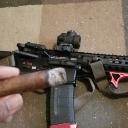Yahoo Answers is shutting down on May 4th, 2021 (Eastern Time) and the Yahoo Answers website is now in read-only mode. There will be no changes to other Yahoo properties or services, or your Yahoo account. You can find more information about the Yahoo Answers shutdown and how to download your data on this help page.
Trending News
Are 1911 handguns good for self defense?
So I'm turning 21 in 2 months and I'm looking into financing a handgun. I'm wanting to keep it in my personal vehicle for self defense. I've used .45s before and I know what I'm getting into by choosing a larger caliber with my small body frame. But most of the shops that carry handguns around here only have full size 1911s or 1911 clones. 9mms are cheaper and have a broader selection around here, but I've never used one and heard they jam a lot easier than .45s, which is bad if I have to use it for self defense. So my question is should I get a FULL SIZE handgun to keep in my car or should I maybe look into other calibers and try to get a Glock or a Beretta? I'm just looking for reliability and stopping power pretty much.
14 Answers
- Mark JackLv 76 years ago
Don't listen to anyone that says something like " 9mm jam easier than a .45" That is as incorrect as possible, like saying 4 cylinder cars are more reliable and 8, far too general to have any meaning.
When NATO tested the CZ P01 9mm ( just using it for an example) it cycled 15,000 rounds and had 7 jams which far surpassed the standard requirement for the military ( at leased double). So it all depends on the quality of the gun, not the caliber.
Too find what fits you try a few quality guns out at the range. Personally I'd look into something that I could use for concealed carry. I carry a full size and suggest you look into a compact for carry, a full size can be carried relatively comfortably depending on the gun, holster and how you carry but a compact is just easier.
Common guns you will likely see include the Glock's, S&W M&P's and Springfield XDm's. They are all polymer framed striker fired and cost less than a Colt 1911. If you don't shoot at least hold each model to see what you find comfortable.
9mm and 45 ACP are both good rounds and can be used for carry and defense. There is little real world performance difference between the two but .45 has about 2x the recoil, don't be mislead my the recoil they have similar energy and I carry a 45. Like to swap to a 9mm compact in the future. .45 is also a good home defense round.
- The SheepdogLv 76 years ago
By "self defense," do you mean for concealed carry, or for home defense?
For concealed carry, the 1911 is not a great choice because the full-size ones are well, full size, and compact models for some reason seem to be experiencing problems. The .45 ACP round also severely limits your ammo capacity, which isn't always a huge factor but if you're carrying concealed, you probably only have one magazine (*maybe* two). Stick to 9mm or .380 for concealed. Compact pistols such as the Smith & Wesson Shield are your best bet.
For home defense, the 1911 is fine, but you can get cheaper pistols that are going to do the job just as well and will cost you probably $200 less. The power difference between 9mm and .45 is so negligible that your own skill as a shooter (shot placement) is going to have a much greater impact. 9mm will allow you to get more shots on target quicker, while .45 is *marginally* more forgiving. .40 is another option, though I personally do not like it. Rather than being a beneficial compromise, it's more like taking the worst of both calibers and putting them together.
The caliber has nothing to do with jamming. Certain manufacturers insist on building overly complicated products that are more prone to malfunction. If you stick to companies like S&W, Walther, Glock and Sig, odds are extremely good that any reliability issues you have are going to be a result of user error.
- GlacierwolfLv 76 years ago
Keeping a handgun in a personal vehicle - most definitely not a good plan. Way, way too many bad things can happen. Car gets stolen - you are gonna earn the wrath of your local police - for forever - for leaving a pistol in that car. Same thing happens when u part at the local mall and some kids bust your window and take everything nailed down...... how are you gonna feel when one accidentally shoots and kills another kid? Or you get into an accident, get rushed to the hospital and forget it's in there - and some tow driver hurts himself trying to remove it? You do realize you open your glove box and a gun falls out - you could get shot by a jittery cop?
If you are going to own a handgun - you need to accept the responsibility of keeping it out of other people's hands. That means it gets locked up or put in a safe at night - and - carried on your person or in a pistol case.
You have a small frame. That means you DO NOT buy a gun first.... you start by finding holsters that fit you first - then go and look at guns that fit that model of holster. You can buy a cheapo bad fitting Uncle Mikes 'one size fits nobody' for $15 or drop some serious money on a Galco leather holster for $250+. Galco holsters - once on- you almost forget you are wearing a gun.
All brand name guns - do not jam. Maybe the occasional one - but it is rare. 9mm do not jam more, or less than 45 or any other cartridge. When you buy a new pistol - first thing you do is buy one box of every type of ammo found locally from cheap to pricy - test them out - this also helps break in a new pistol. Anything that jams - usually the cheap stuff - avoid.
1911 - is what I compare all guns to. They typically only hold 7 or 8 rounds. If you are a cop - you need more than that. If your neighborhood is plagued with home invasions - you want more than 7 or 8 also.
- AndyLv 76 years ago
If you are not familiar with guns a 1911 is not a good choice for a beginner. A DA/SA semi auto pistol would be better. Personally I would never leave a gun in a car unless I was carrying it and had to go in somewhere that didn't allow guns. If I did leave a gun in a car it wouldn't be a very expensive one. A good reasonably priced gun would be a Bersa 9 mm. Whoever told you that 9 mm jams more doesn't know what they're talking about. ANY gun can jam. As long as get get a quality gun and the right ammo it should be fine. You find that out by shooting it. Some guns can be picky about firing hollow point ammo. You should start with going and handling as many different guns as you gun. When you find a few that you like then try to find a range that rents guns and try the ones you like if possible. A class on gun safety and shooting practice would be wise too.
- JeffLv 76 years ago
Apply for your permit to carry.
Get some training... first in gun safety, pistol marksmanship and finally-- self defense using a handgun.
Learn to shoot move and reload under pressure. Find an IDPA club and shoot those matches on some regular basis.
Keeping a gun in the car is not a plan. And the 1911 can be a tough gun to master in a high stress situation unless you are very familiar with it.
- lostupnorth715Lv 56 years ago
Congrats on turning 21! Here's some handgun 101 info that will help. The caliber of bullet has nothing to do with whether the gun jams or doesn't jam. When it comes to guns for self defense, realize that a 1911 is 100+ year old technology. Yes, they still work fine and they're fun and fantastic to own, but there are better options for self defense. They carry more rounds, aren't as heavy and aren't as finicky.
So let's talk about self defense and break it down into three classes. The home defense gun, the conceal carry gun and in your case, the car gun.
Starting with the car gun, you have to be aware of a couple of things. First is that it's most likely to be stolen because you're not there and cars are broken into all the time. For that reason, a $1000 1911 may not be the best option. Secondly, you must always lock your car or you will likely be in violation of gun safety laws. If you leave your gun in your car and don't lock the car you have unwittingly provided access to a loaded and unlocked gun to minors which is illegal in most states. So my advice for a car gun is to use the one you carry. Just take it out of the holster and stick it in a car holster while you're driving.
For conceal carry, you need a gun you will actually carry. You'll hear a TON of tough guy talk about stopping power but it's ridiculous. If you'll actually carry a little Tauraus PT22 in your pocket all the time, then by all means get a little PT22. As they say... the first rule of a gun fight is to always bring a gun.
Now regarding the "stopping power" myth, I wish the Internet would just STOP with that already. Ask any hunter whether they would rather have a good shot with a 22-250 on a deer or a bad shot with a 300 Win Mag and they'll tell you that they'll take the good shot with the 22-250. The same applies to self defense guns. Shot placement is king and WAYYYYY more important than any caliber discussion. Pick a gun you'll like to practice with so that you can make good shots.
So now that we know that having a gun with you is important AND shot placement rules, I'll just share with you some recommendations for different classes of guns and why I'd recommend them.
CONCEAL CARRY:
1) Single stack subcompact 9mm: Ruger LC9s (not the LC9), S&W Shield, Kahr PM9, Glock 43, Springfield XD, Walther CCP (6-7+1 rounds of 9mm and easy to carry which means likely to be carried. The ammo is cheap and available so you'll practice and all the guns listed are good shooters.)
2) Small frame revolver: Ruger LCR (or LCRx) or the S&W M&P Bodyguard (revolvers are 100% reliable with no failure to feed issues, no failure to eject issues AND they are amazingly comfortable to carry because they don't have hard straight lines like a sem-auto, they sort of mold right to your body)
3) Small 380 Auto: Ruger LCP or S&W Bodyguard, Walther PPK, Glock 42 (the 380's are great guns for self defense. They're basically a 9mm with just a little less energy. They're a lot smaller so they're easier to carry but they're also a little snappy to shoot so that's a consideration.)
CAR GUN: - use your conceal carry gun.
HOME DEFENSE:
1) Double stack full size 9mm: S&W M&P9, Glock 17, Ruger SR9, Kahr, Springfield, Walther PPQ, CZ75, Beretta, Sig, H&K (there isn't a second option because there really isn't a second option. Once you've actually had to defend yourself in your home, you quickly realize the flaws of virtually all other options. You want something that holds enough ammo to deal with multiple intruders or extended confrontations. You want something that only requires one hand to operate in case you are injured, moving or carrying a kid or something. You want something that you can hold in your teeth while you climb out a window to safety. For all those reasons, the double stack 9mm is the best home defense gun.)
In the end, the best advice is for you to pick out a good conceal carry gun and use that as your self defense gun at home, in the car and where ever you are. As funds allow, add a good home defense gun. If you ever get money to play with you'll probably "retire" your conceal carry gun to the car and get something different for carrying.
Final bit of advice. Do NOT buy a Hi Point or a Kel-Tec. They are junk. Taurus is OK, but the brands listed above are better if you can swing the extra $50.
- ?Lv 76 years ago
You notice many speak of an EXPERIENCED shooter ? There are two things VERY important to consider. I have seen this VERY often as an Instructor. One the 1911 is complex to operate. Complex to understand and know how to handle one safely. I mean there are 3 active safeties on A Colt 1911, and two passive safety devises incorporated. Did YOU know that ? If not I would say again, too complex for a beginner. Second is the heavy recoil of any large caliber handgun. No matter how tough you think you are, I say AGAIN from experience, the heavy recoil intimidates most beginners. Point is most will stand there and sight the gun better, squeeze the trigger much better, and follow through without flinching using a smaller caliber firearm. First firearm should be for the purpose of learning to shoot well.
Does it make one iota difference how big the gun is if you miss ? I have seen it countless times. You hand a beginner a large handgun, and before the first magazine is empty, they are already dropping shots low left. Flinching. Now once they start that, hand them the .22LR handgun, the flinch did not go away. That sir, is an easy demonstration, of how a large caliber handgun influences a beginner.
Think about it...............
ADDED Hahaha, seems to be a whole bunch of BEGINNERS this time of day. Clueless LOL, my grin of the day, late but, soon enough
- ?Lv 76 years ago
I agree with Mark Jack, don't believe the stupidity of people who tell you things like that. But, my personal carry tool is a 1911. Why? Because the slow, fat .45 cal is effective and I LOVE the simplicity of the action! If(I have never had it happen) There is a stove pipe jam, it only takes a swipe of the hand to render it serviceable.
- Anonymous6 years ago
Yes, they are good for home defense in the hands of an experienced and trained shooter. An inexperienced shooter should settle for something a little easier to shoot well, like a 9mm or a .38 Special.







